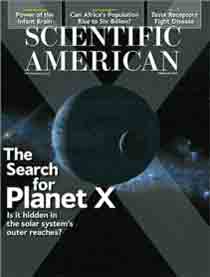Can a brain’s connectome be preserved forever?
The soul is the pattern of information that represents you—your thoughts, memories and personality—your self. There is no scientific evidence that something like soul stuff exists beyond the brain’s own hardwiring, so I was curious to visit the laboratories of 21st Century Medicine in Fontana, Calif., to see for myself an attempt to preserve a brain’s connectome—the comprehensive diagram of all neural synaptic connections.
This medical research company specializes in the cryopreservation of human organs and tissues using cryoprotectants (antifreeze). In 2009, for example, the facility’s chief research scientist Gregory M. Fahy published a paper in the peer-reviewed journal Organogenesis, documenting how his team successfully transplanted a rewarmed rabbit kidney after it had been cryoprotected and frozen to -135 degrees Celsius through the process of vitrification, “in which the liquids in a living system are converted into the glassy state at low temperatures.”
Can brains be so preserved? Fahy and his colleague Robert L. McIntyre are now developing techniques that they hope will win the Brain Preservation Technology Prize, the brainchild of neuroscientist Kenneth Hayworth (I’m on their advisory board as the advocatus diaboli). As I write this, the prize is currently valued at more than $106,000; the first 25 percent of the award will be for the complete preservation of the synaptic structure of a whole mouse brain, and the other 75 percent will go to the first team “to successfully preserve a whole large animal brain in a manner that could also be adopted for humans in a hospital or hospice setting immediately upon clinical death.” (continue reading…)
read or write comments (16)
The dualist belief that body and soul are separate entities is natural, intuitive and with us from infancy. It is also very probably wrong
When I was 17 in 1971, I purchased my dream car — a 1966 Ford Mustang — blue with a white vinyl roof, bucket seats and a powerful eight-cylinder 289-cubic-inch engine that could peg the speedometer at 140 miles per hour. As testosterone-overloaded young men are wont to do, however, over the course of the next 15 years I systematically wrecked and replaced nearly every part of that car, to the extent that by the time I sold it in 1986 there was hardly an original piece remaining. Nevertheless, I turned a tidy profit because my “1966” Mustang was now a collector’s classic. Even though the physical components were not original, the essence of its being — its “Mustangness” — was that model’s complete form. My Mustang’s essence — its “soul” — was more than a pile of parts; it was a pattern of information arranged in a particular way.
The analogy applies to humans and souls. The actual atoms and molecules that make up my brain and body today are not the same ones that I was born with on September 8, 1954, a half-century ago this month. Still, I am “Michael Shermer,” the sum of the information coded in my DNA and neural memories. My friends and family do not treat me any differently from moment to moment, even though atoms and molecules are cycling in and out of my body and brain, because these people assume that the basic pattern remains unchanged. My soul is a pattern of information. (continue reading…)
Comments Off on Mustangs, Monists & Meaning
A review of Martha Sherrill’s The Buddha from Brooklyn: A Tale of Spiritual Seduction.
There is a humorous scene in Woody Allen’s Hannah and Her Sisters, when his unfulfilled and neurotically Jewish character fails to find meaning in alternate religious expressions after visiting a Catholic church and returning home with a loaf of white bread, a jar of mayonnaise, and a crucifix. The reason, of course, is that the trappings and facade of a religion will not get you to that deeper place where so many desire to go.
Why do people believe in God? Why have all people throughout history, in all cultures around the world, embraced some sort of spiritual expression or religious impulse? Social scientists have attempted to answer the question scientifically through theories and statistics, but humans are storytelling animals and nothing captures the essence of a belief better than an in-depth story about one group’s religious experiences as they struggle with the messiness of day-to-day living in a secular world. (continue reading…)
Comments Off on Desperately Seeking Spiritualism




